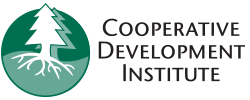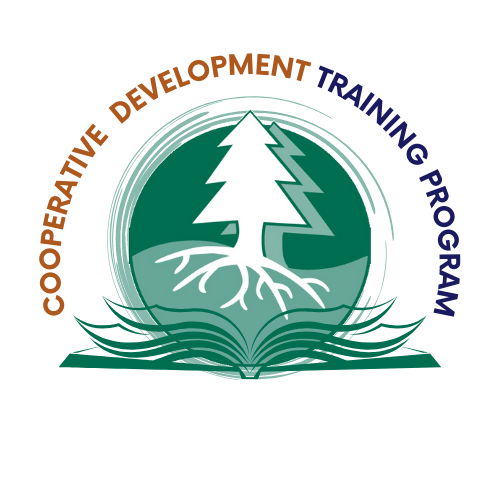You are the future of the co-op economy!
Cooperative Development Training Program
A free, hybrid (online and in-person) introductory training program for future co-op developers and organizations incubating cooperative initiatives.
Bilingual course offered in English & Spanish.
Enrolling now for Part 1: Getting Started with Co-op Start Ups, our 9 month course beginning in February 2025.
Bilingual course offered in English & Spanish.
Enrolling now for Part 1: Getting Started with Co-op Start Ups, our 9 month course beginning in February 2025.
Write your awesome label here.

About the Program
Learn the skills to steward cooperative projects.
This introductory, interactive course will help you build skills as a co-op developer or “Cooperation Steward.” Learn the principles and practices of cooperative development and cultivate your own portfolio of practice.
This is not a traditional “co-op academy!” Rather than learn how to start your own individual co-op, you will learn how to guide other groups to develop cooperative projects. The goal of this program is to build cooperative development knowledge among partners, who can steward the growth of co-ops and cooperative economies in their local communities.

Cultivate a community of cooperatives and cooperative developers!
Our unique cohort program brings together individuals and organizations across the Northeast and broader regions to build relationships and cooperative networks. Meet and collaborate with other passionate people working to solve hard economic problems in their local regions through cooperative and solidarity strategies.
Program Structure
The Cooperative Development Training program is divided into three parts, which are sequential and build in depth. See further below for a breakdown of the course content. We are currently enrolling for Part 1 of the program and will offer Parts 2 and 3 in 2026. Participants in Part 1 are not required to participate in all three parts, but we welcome and encourage you to join for all three. Stay tuned for more details at the end of 2025!
What to Expect
This program is participatory and relationship-based, with interactive discussions and activities. Come prepared to participate and to share your knowledge and experience with your fellow learners. We believe that everyone has knowledge to offer and knowledge to learn.
Sessions will include modest pre-work of approximately 25-40 minutes of video materials to complete before each session. Completing the pre-work is essential for this program. These video materials contain the basic course content, which we will use as the foundation for our group sessions. You may complete the pre-work on your own time, or you can attend optional Zoom watch sessions.
Sessions will include modest pre-work of approximately 25-40 minutes of video materials to complete before each session. Completing the pre-work is essential for this program. These video materials contain the basic course content, which we will use as the foundation for our group sessions. You may complete the pre-work on your own time, or you can attend optional Zoom watch sessions.
Who Is This Program For?
This program is ideal for:
Write your awesome label here.
Course Overview & Timeline
Part 1: Getting Started with Co-op Start-Ups (Feb-Oct 2025)
In Part 1, we will introduce learners to the principles and practices of cooperative development, covering three of the five development phases and the various models of cooperatives that exist. We will delve into the role of the Cooperation Steward and help learners decide if this role is a good fit for them.
-
2 in-person Community of Practice sessions (virtual option available)
-
8 monthly 2 hour online sessions
-
Optional Zoom sessions to watch pre-work video modules
-
Bilingual English/Spanish
-
Handout, slides, and course materials available in our online portal
-
Food, travel reimbursement & some housing available for Community of Practice sessions
Community of Practice 1:
Relationships
In-person | February 22, 2025
1. Intro to Co-ops:
Structure & Membership
Online | March 18, 2025
2. Intro to Co-ops:
History & Ecosystems
Online | April 15, 2025
3. Being a Developer & Co-op Steward
Online | May 20, 2025
4. Unpacking Skills & Resources
Online | June 17, 2025
5. The Explore Phase
Online | July 15, 2025
6. The Assess Phase
Online | August 19, 2025
7. Business Planning
Online | September 16, 2025
8. The Structure Phase
Online | October 21, 2025
Community of Practice 2:
Co-op Stewardship
In-person | October 2025
Part 2: Tools and Strategies for Implementing and Sustaining Co-ops (TBD 2026)
In Part 2, we will support learners in solidifying their goals and identities as Cooperation Stewards and developing their portfolio and practice. We will also explore the final two phases of cooperative development and learn about the participatory management approach to financial stewardship.
-
1 in-person Community of Practice session (virtual option available)
-
4 monthly virtual sessions
Part 3: Taking Cooperation to the Next Level (TBD 2026/2027)
In Part 3, we will support learners in diving deeply into CDI’s tools and ideas surrounding the following: (a) growth and transformation planning for co-ops, (b) transitioning existing businesses to co-ops, and (c) mobilizing ecosystems into cooperative/solidarity economies.
-
1 in-person Community of Practice session (virtual option available)
-
4 monthly virtual sessions
Meet your facilitators!
Katherine Bessey
Andrew Stachiw
Addy Schuetz
Frequently Asked Questions
How do I know if I am a good fit for this program?
Can I participate in a different language other than English?
Yes, the course will be taught in both Spanish and English, with videos and materials available in both languages. We creatively use simultaneous interpretation, consecutive interpretation, break out groups, and language justice tools to facilitate an effective multilingual space.
Do we need to commit to attending all the training sessions?
Yes, please plan to attend and participate in all class sessions, although we understand that emergencies occur. All handouts, slides, and course materials will be available on our online course portal.
If you are joining as part of an organization, we ask that at least one person from your team commit to attending and participating in all class sessions.
If you are joining as part of an organization, we ask that at least one person from your team commit to attending and participating in all class sessions.
How much homework is there?
Each monthly session will include modest pre-work of 25-40 minutes of video materials to watch before each session. Completing the pre-work is essential for this program. These video materials contain the basic course content, which we will use as the foundation for our group sessions. You may complete the pre-work on your own time, or you can attend optional Zoom watch sessions that we will host during the same week as the class session.
How much time will we spend networking with peers?
We believe that building our cooperative ecosystem (aka our community of diverse cooperatives that support each other) is essential. We also believe that peer-to-peer learning is vital. Therefore, our program is highly participatory. We will include plenty of discussions, interactive activities, case studies, breakout groups, and networking and Q&A time. We also encourage you to build connections with other participants outside of class!
I am interested in starting a housing co-op. Will this program be applicable to me?
Yes. The processes of developing housing and business cooperatives are largely the same. We will share housing-specific information in this class.
Is there access to professional service providers? (attorney, CPA, etc)
Yes! We will invite experienced Certified Public Accountants and attorneys, and other service providers as needed to consult on projects. We share the information that they have shared with us on topics such as co-op finances, incorporations, and internal systems of accounts and patronage.
Will I complete any projects during this program?
Each participant will complete their own “Co-op Developer Portfolio,” in which you will develop your personal goals and ethos around cooperative development work, map your cooperative ecosystem, develop a database of resources, and more. This portfolio will be a resource for you to use in your future work. After completing CTDP, we will also give you a course completion packet with materials to help support you beyond the end of the class.
